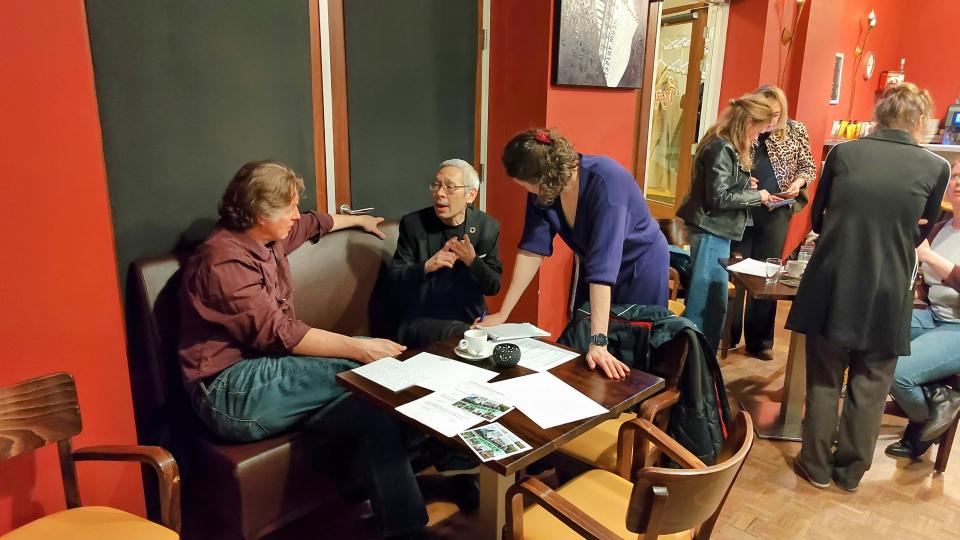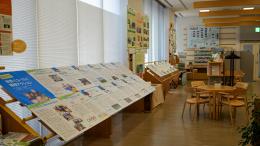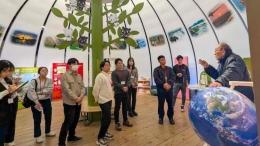In the face of growing climate concerns, finding ways to transform anxiety into positive action remains a critical challenge for communities worldwide. One approach gaining traction combines psychological insights with community engagement, focusing on how positive emotions can mobilise sustainable action.
This intersection of psychology and sustainability isn't just theoretical: it's being put into practice in communities seeking practical pathways forward. One such example recently unfolded in Heerlen, a city in the southern Netherlands, where local residents and university researchers, including UNU-MERIT's Job Zomerplaag, came together to reimagine their community's future through the lens of positive psychology.
On Monday evening, 24 March 2025, the Cultural Centre in Heerlen hosted a workshop titled "Positive Psychology for a Best Possible World." The event brought together 25 local initiative leaders—individuals who already spearhead neighbourhood projects such as community gardens and cultural activities that foster community spirit.
Heerlen, a city in the southern Netherlands near the German and Belgian borders, faces significant socioeconomic challenges stemming from its post-industrial heritage. Once a thriving coal mining centre, the city suffered severe economic decline after the mines closed in the 1970s, leading to high unemployment, population shrinkage, and urban decay. The city continues to grapple with above-average poverty rates, health inequalities, and environmental challenges from its industrial past. These compounding issues make community-led revitalisation efforts particularly significant in Heerlen's ongoing transformation.
An Interdisciplinary Approach
The workshop stemmed from the research project "Optimism as a source of renewable energy in the transition towards a fossil-free society"—a collaboration between various researchers from Maastricht University. Dr Nicole Geschwind and Dr Marjolein Hanssen from the Faculty of Psychology and Neuroscience joined forces with Prof Dr Mark Sanders from the School of Business and Economics and Job Zomerplaag from UNU-MERIT. Their shared goal: to investigate how positive emotions can inspire people towards sustainable action, rather than letting climate concerns degenerate into passivity, resistance, or despondency.
The evening was co-organised by Frisse Wind Heerlen (Fresh Wind Heerlen), a residents' participation fund supported by Heerlen Municipality, the VSB Fund, and the National Programme Heerlen North. Through their Fresh Wind Academy, which takes place six times a year, residents receive tools to strengthen their own initiatives and learn from each other.
From Theory to Practice
After an introduction by Job Zomerplaag, who, in addition to his work as a PhD candidate at INSPIRE/UNU-MERIT and programme maker at Studio Europa, is also the regular facilitator at Frisse Wind, Dr Marjolein Hanssen took the floor. She briefly explained what positive psychology entails—the science that investigates how positive emotions influence our thinking and actions.
"What evokes positive emotions for you?" she asked the audience. The answers ranged from nice weather and sports to doing things together and empathising with others. She then explained the link between nature and wellbeing, elaborating on the '3-30-300 rule'—a concept from urban planning for healthy neighbourhoods: for good health, everyone should be able to see 3 trees from their window (which reduces stress), 30% of the neighbourhood should be covered with tree canopies (which reduces heat stress and promotes biodiversity), and a park or natural area should be accessible within 300 metres (which stimulates physical activity and strengthens social cohesion).
A quick poll revealed that about half of those present met these criteria in their living environment. Another insight: Heerlen appears to be a champion of heat stress—a phenomenon where urban areas become significantly warmer than their surroundings due to the presence of stone, asphalt, and concrete that retain heat. In 2018, the highest temperature in the Netherlands was even measured at the retail park—a result of too much stone and too little cooling greenery, with negative effects on the liveability and health of residents, such as increased mortality among the elderly and more respiratory complaints.
From Concern to Action
Dr Nicole Geschwind took over and gauged the mood in the room: how concerned are people about climate change and how optimistic about possible solutions? The responses showed, on average, great concern but also a reasonable level of optimism.
Geschwind explained how, according to research, positive emotions lead to more openness, creativity, exploration, and perseverance—all important qualities when tackling major societal challenges. Positive emotions broaden our thinking and enable us to build new skills and resources. This formed the basis for the intervention 'Best Possible World', a proven psychological exercise where people imagine a positive future to stimulate optimism and goal-directed behaviour—the core of the workshop.
The Power of Imagination
Participants were shown AI-enhanced photos of a green Heerlen, which provoked both positive and critical reactions. "Who's going to maintain all that greenery?" and "What about blocked gutters from all that greenery?" some wondered. But the images did open a conversation about possibilities.
Nicole Geschwind then read out a description of a future vision and asked participants to visualise it. Here too, the reactions were mixed: "I switched off at the humming of the wind turbines. Get rid of them," one person remarked. Another responded: "I had trouble keeping my attention. I already saw the green Heerlen in my mind." And a third person said: "I've been dreaming that image my whole life. It's the final scene from Interstellar."
When the conversation shifted to "your Heerlen," various visions emerged. Participants advocated for "human scale" and "away with the concrete blocks." Dreams were shared about green roofs, energy-efficient housing, streams through streets, and urban gardens. Someone described a permaculture garden—an agricultural system that mimics natural ecosystems with plants that support each other—on a former vacant lot, with a mix of fruit, vegetables, art, and culture.
Geschwind explained that the intervention was originally developed for treating depression, which explains why it is strongly focused on individual action. The workshop then focused on hopeful initiatives already taking place in Heerlen.

From Dream to Deed
A lively exchange emerged about concrete plans to add more greenery to Heerlen's centre. Participants emphasised that benches should not be forgotten in such developments, so that less mobile people can also enjoy these green spaces.
The vegan food festival ZomerMaanFeest (Summer Moon Festival), with its third edition planned for September 2025, was also mentioned as a positive example. The workshop leaders underscored the importance of small, achievable steps and emphasised that much is already happening in Heerlen. Small actions set large changes in motion.
Reflection and Looking Ahead
Job Zomerplaag concluded the workshop with a creative invitation: write a postcard to your future self from the future Heerlen—a tangible memento to preserve the positive energy of the evening.
Kristy Hollands, scout-coach of Frisse Wind, thanked all attendees and summarised the essence: "Thinking positively together leads to action and helps us seek each other out."
In the closing reflection, it was noted that the workshop had provided valuable insights, but that consideration could also be given to how the intervention could be further broadened to reach larger groups. An adapted workshop could be particularly valuable for people with more influence, such as policymakers and politicians.
Many participants in this workshop were already motivated to contribute to a better future, as evidenced by the initiatives they have set up. A follow-up question is how these methods can be used for groups for whom sustainability and collective action are less self-evident—one of the questions the researchers will continue to explore.
The workshop "Positive Psychology for a Best Possible World" was organised as part of the research project "Optimism as a source of renewable energy in the transition towards a fossil-free society"—an interdisciplinary collaboration between Dr Nicole Geschwind and Dr Marjolein Hanssen from the Faculty of Psychology and Neuroscience and Prof Dr Mark Sanders, School of Business and Economics, and Job Zomerplaag from UNU-MERIT. The project is funded by seed money from Sustainable UM2030—a programme that supports research projects on the theme of sustainability within the university with start-up funding.





